(Cross-posted from Daily Kos)
Oregon, along with Kentucky, will be the states that help put Barack Obama over the necessary number of pledged delegates needed to attain a majority of them – and thus nullify and serious argument Hillary Clinton can make about deserving the nomination. With the movement of pledged delegates from John Edwards to Obama following the former’s endorsement, Kentucky will actually be the state that officially vaults Obama over the number – even though it will be in Oregon where he will triumph.
Although Bill Clinton had been hitting the rural areas of the state heavily in support of his wife, as has been his habit lately, the Clinton campaign seems to have given up on the state – both of the Clintons are campaigning in Kentucky today, futilely hoping that the media narrative will focus on her big win there instead of the reality that winning the nomination becomes impossible for her after Tuesday. Obama has spent the entire weekend in the state, capping his visit with a monstrous rally in Portland. Below the fold, I give my predictions for what will happen in the state’s primary.
Oregon (May 20th primary, 52 pledged delegates)
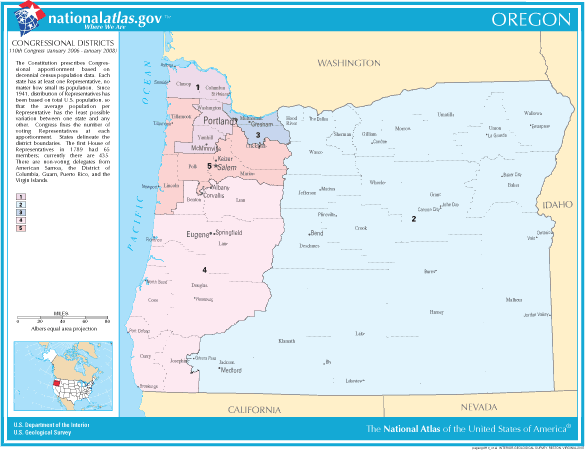
Oregon is an interesting state: it has 4 of its 5 congressional districts lined up along the I-5 corridor (all of which are represented by Democrats), while the remaining district (CD-02) represents the vast majority of the state, geographically, and has a Republican representative to Congress. The latest polling average shows Obama with a fairly healthy lead double-digit lead (disregarding the latest ARG poll, which should be taken with the appropriate grain of salt). The state is overwhelmingly white (roughly 93%), but like Washington State, where Obama routed Clinton in the state’s February 9th caucuses, Obama should perform very well in the state. Obama was also able to win the state’s non-binding February 19th primaries by 5.5% without any effort – a good sign that Obama should significantly widen his margin in Oregon given the effort he and his campaign has been putting in.
On the superdelegate front, Obama has the endorsement of 3 of Oregon’s Democratic representatives – David Wu of CD-01, Earl Blumenauer of CD-03, and Peter DeFazio of CD-04. Clinton has the backing of Gov. Ted Kulongoski and retiring Rep. Darlene Hooley of CD-05.
OR CD-01: 7 delegates
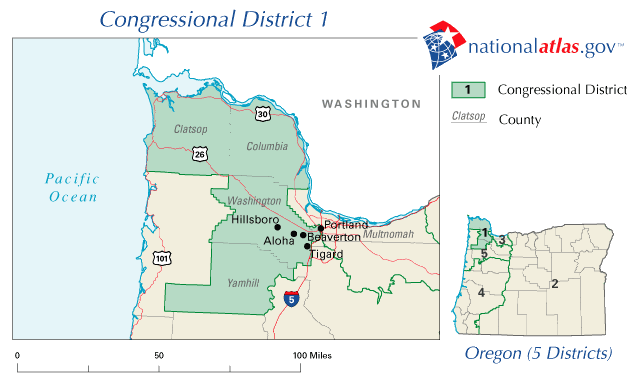
CD-01 represents a portion of Portland, as well as its fairly wealthy suburbs (the district has the highest median income of all 5). It should be expected that Obama will gain the majority of pledged delegates in the district, but can he break the 64.3% marker to get a 5-2 split? If this was a caucus, I would guarantee it (just check out the results from the counties that border the district in Washington). However, since it is a primary, Obama will probably fail to hit that margin – but will come close.
Allocation of CD-01 delegates
Barack Obama: 4 pledged delegates
Hillary Clinton: 3 pledged delegates
OR CD-02: 5 delegates
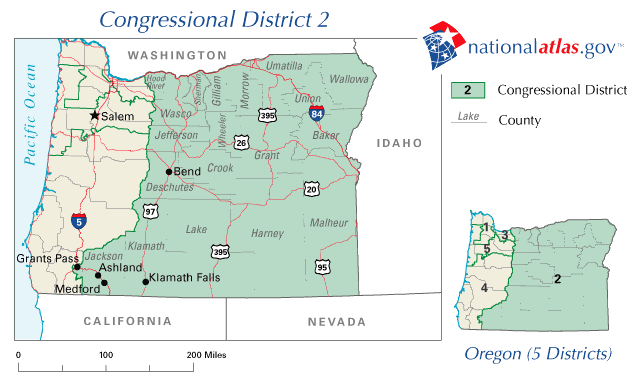
Although one would expect Clinton to perform well here – the district is the most rural of Oregon’s districts and has the lowest median income in the state – Obama has performed well in rural districts in the Pacific Northwest and the Mountain West. Even in Washington’s non-contested primary, Obama secured more votes in the bordering counties. He should be favored to net out the extra delegate, but he will come nowhere close to the 70% needed for a 4-1 split.
Allocation of CD-02 delegates
Barack Obama: 3 pledged delegates
Hillary Clinton: 2 pledged delegates
OR CD-03: 9 delegates
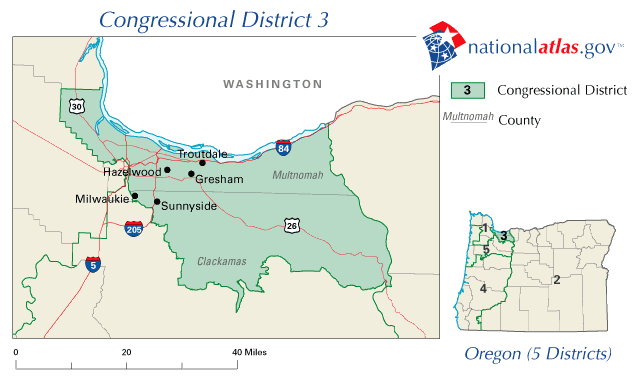
This district has the most delegates and should be expected to favor Obama. With a median income near the state average, it’s certainly not the kind of wealthy white enclave that would be expected to go to Obama readily. However, given that he and his campaign have focused vigorously on the Portland area during their campaign, I feel that he will be able to break the 61.11% barrier needed to earn a 6-3 split in the district. There’s a possibility that he may only get a 5-4 victory here, though.
Allocation of CD-03 delegates
Barack Obama: 6 pledged delegates
Hillary Clinton: 3 pledged delegates
OR CD-04: 7 delegates
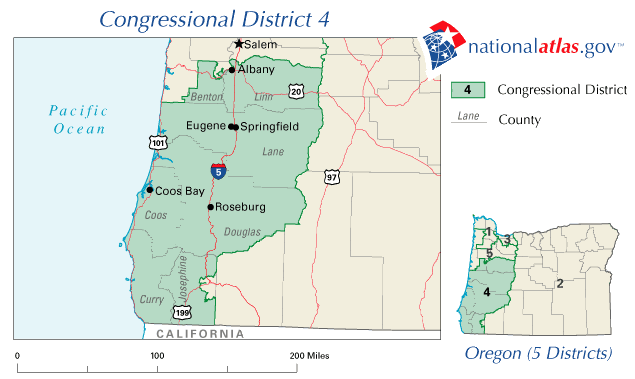
While the district has a median income well below the state average, Obama will probably win this district due to the liberal enclave of Eugene, where he should be expected to rack up huge margins in his favor. That should be enough for a 4-3 split; unlike CD-01, though, I think he will be hard-pressed to come anywhere near the 64.3% that would get him an extra delegate.
Allocation of CD-04 delegates
Barack Obama: 4 pledged delegates
Hillary Clinton: 3 pledged delegates
OR CD-05: 6 delegates
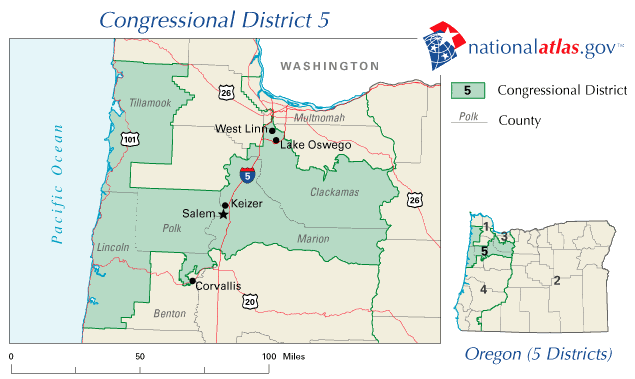
This district stretches from the middle of the state, through the capital of Salem, to the suburbs of Portland. Given that this district tends to be younger and has the second-highest median income in the state, Obama should be well-positioned to take a majority of the popular vote. Given that it is a district with an even number of delegates, though, Obama would need more than 58.5% of the vote to tip the scales in his favor. Personally, I think it will happen and will thus allocate the extra delegate to him.
Allocation of CD-05 delegates
Barack Obama: 4 pledged delegates
Hillary Clinton: 2 pledged delegates
At-Large Delegates (12 delegates) and Pledged PLEO Delegates (6 delegates)
This is an area where the popular vote will be key in picking up additional delegates. For Obama to get a majority of the at-large delegates, he needs more than 54.16% of the vote – something that, given the recent polls, seems very attainable. However, he would need an extremely good day – combined with fairly depressed turnout among unmotivated Clinton voters – to break the 62.5% barrier to get an 8th at-large delegate. That being said, I do question if Obama will be able to take more than 58.5% needed to gain the extra pledged PLEO delegate. Grossing up the 2 most recent reliable polls (SurveyUSA and PPP) leaves me with an average of approximately 56.6% for Obama, which I think he’ll outperform due to friendly demographics and a much stronger campaign apparatus in-state. Therefore, I predict that Obama will take 59.7% of the two-way popular vote, while Clinton will get 40.3%.
Allocation of at-large delegates
Barack Obama: 7 pledged delegates
Hillary Clinton: 5 pledged delegatesAllocation of pledged PLEO delegates
Barack Obama: 4 pledged delegates
Hillary Clinton: 2 pledged delegates
Conclusion
All in all, I see Barack Obama receiving 32 pledged delegates from Oregon, while Hillary Clinton will take away 20, giving Obama a net gain of +12. This will almost offset the 15-delegate loss I see him taking in Kentucky. It’s also a relatively good scenario I have forecast (I tend to err on the side of being conservative in my delegate estimates for Obama), but I think a couple of factors will play into outperformance by Obama in the state. First, the media narrative has been effectively treating Obama as the presumptive nominee – and thus shutting out Clinton from the spotlight. This will likely depress turnout among her soft supporters. Additionally, the Obama campaign has worked the state much harder than the Clintons have, and their total abandonment of it in the days running up to the primary speaks volumes about how they view their prospects there. That being said, there are a couple of factors to consider when looking at best-case and worst-case scenarios.
Best-case scenario for Obama
Obama’s only real improvement in the state will likely come from racking up a large enough margin to get a 5-2 split in CD-01. While one might estimate it to be possible in CD-04 due to Eugene’s presence, I’m not as confident given the district’s less friendly demographics. And although could get another at-large delegate by getting more than 62.5% of the vote, this isn’t a caucus – it ain’t going to happen. A 33-19 split is the best he can hope for.
Worst-case scenario for Obama
I doubt many of these factors will happen – but if there is an undercurrent of support for Clinton that hasn’t been picked up, she could win enough of the vote in CD-02 to flip it in her favor. CD-03 could be reduced to a 5-4 advantage for Obama if she has a lot of support in the Portland area (as SUSA’s poll seems to suggest), and CD-05 could very well become a split. With a popular vote margin under 58.5%, the pledged PLEO delegates also become a tie – but Obama won’t fall below 54.16%, allowing him to keep his extra at-large delegate. In short, a worst-case scenario for Obama turns into a 28-24 delegate victory.
All in all, though, the numbers aren’t too relevant at this point. The media narrative on May 21st will be Obama declaring victory based on the majority of pledged delegates. With only 86 pledged delegates left (55 in Puerto Rico, 16 in Montana, and 15 in South Dakota) – and with Obama’s lead in superdelegates – the only thing that Clinton has a prayer for is Florida and Michigan.
Oh wait, Obama will have a majority of pledged delegates with those states included after Tuesday.
Ergo, it’s over.




